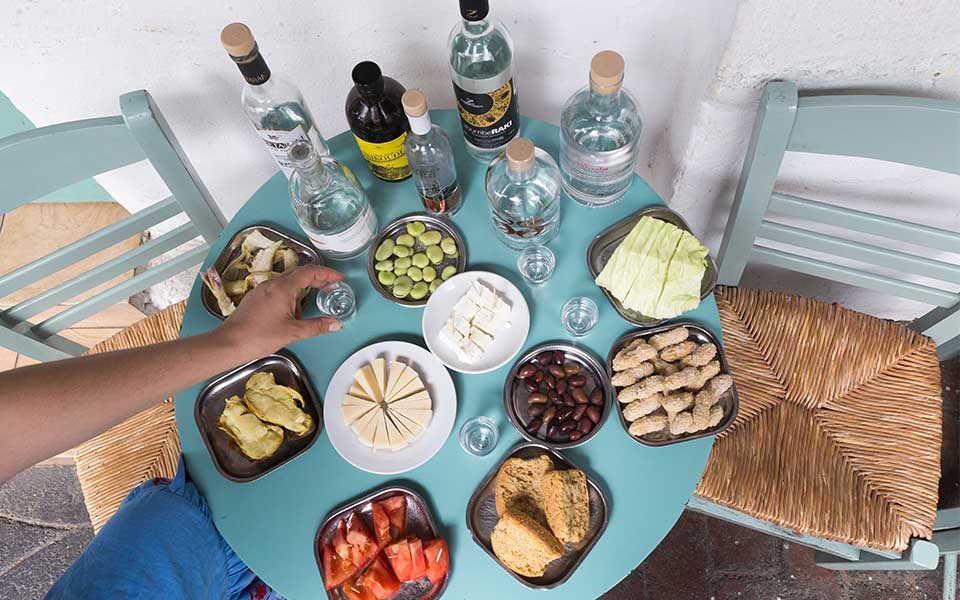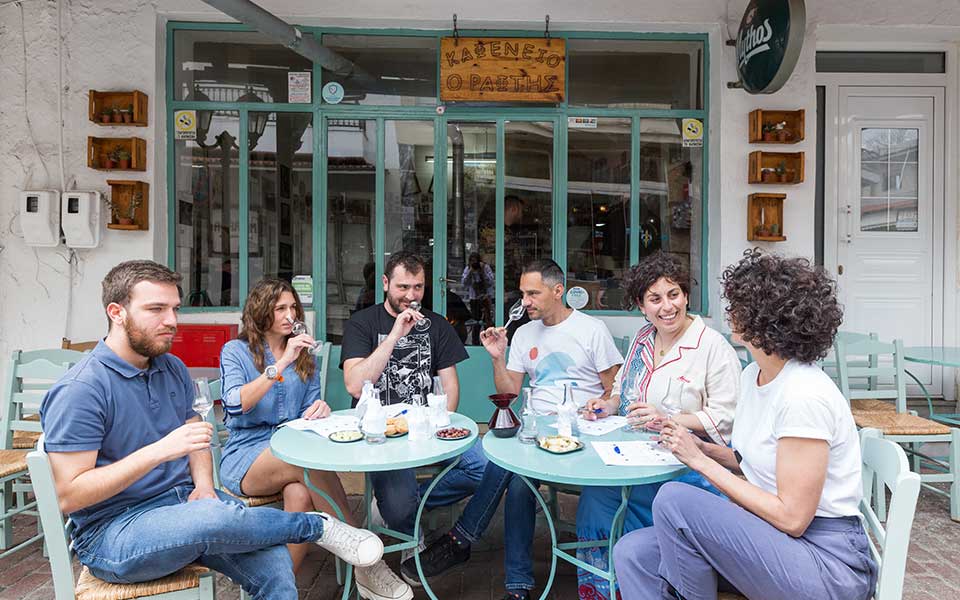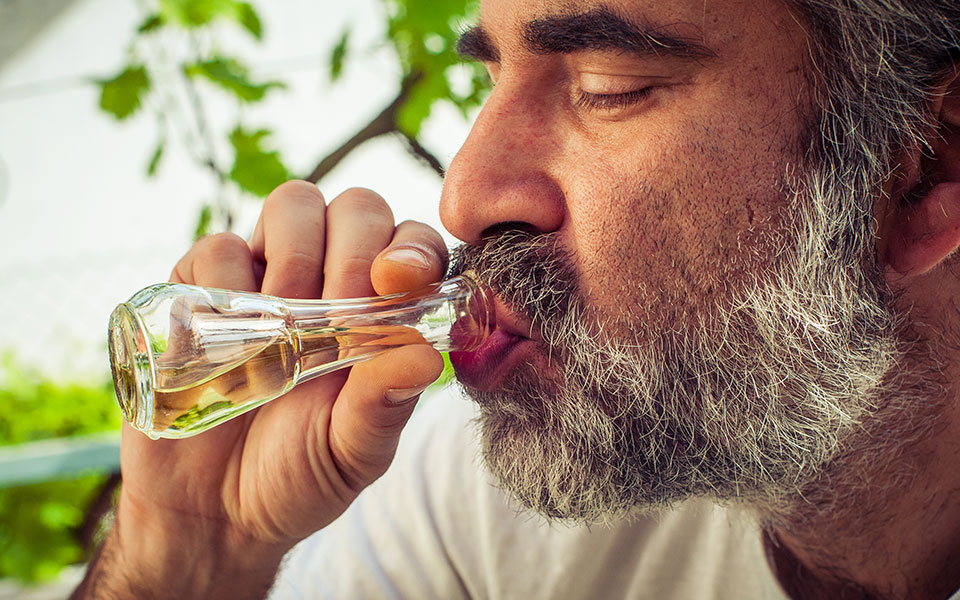Tsikoudia: Cretan raki and the taste of tradition

Those who have found themselves in a “kazani” in Crete, meaning present during the production of tsikoudia (otherwise known as “Cretan raki,” a grape-based pomace spirit) in homes, courtyards, or other spaces that are not distilleries, know that the process takes the form of a celebration, a Dionysian revelry. The same witnesses might agree that traditional distillation should be considered as one of Greece’s examples of intangible cultural heritage. Especially in Crete, where making tsikoudia is a point of reference for social coexistence, encounters and shared joy, it is primarily a cultural process rather than just manufacturing.
The produced spirit is available either already bottled by professional distillers, who are taxed at 25.5 euros per liter of anhydrous alcohol – the highest tax rate in the European Union – or from casual distillers who distribute a specific quantity in bulk. The kafeneio (local coffee shop) or any establishment serving this type of raki, usually sourced from small scale distillers, must prominently display the distillation license and the producer’s name; yet this is not the case for the majority of businesses. The rest is more or less well-known. The same invoice is used for multiple liters of production, adulteration of the product and tax evasion all result in the distillation and sale of the spirit becoming an illegal act.
Considering both its excessive consumption and the offerings of tsikoudia as gestures of friendship, appreciation, and hospitality, the drink seems to have lost its value, wrongly considered a cheap product because it is offered freely and in abundance. Is uprooting traditions and turning our backs on our culture the solution? No. However, it is time to evaluate the type of raki we want to drink and give it the value it deserves as a well-crafted, local spirit.

The process
In a blind taste testing we sampled nine bottled tsikoudies widely available on the market, mainly produced by winemakers. Some were blends from various grape varieties, while others were single varietals – a new category that reflects the producers’ desire to showcase a different premium profile, outside of the traditional taverna setting. They were of great interest and the field appears promising, especially given the availability of so many indigenous grape varieties.
The process was conducted as a blind tasting, with the participants not knowing the products. It took place in the kafeneio owned by Vangelis Avgenakis, known as “O Raftis,” in Spili, Rethymno. During the tasting, which took place in early spring, Vangelis took care of us by serving a generous selection of appetizers: olives, rusks, graviera cheese and cheese from Sellia, salted pistachios, fresh broad beans, and artichoke hearts with lemon dressing. He also served raw cabbage with salt and baked potatoes, the house special.
In the summer, the kafeneio is very popular as it is located on the way to the most beautiful beaches in the southern part of the prefecture. Similar to when it was managed by Giorgos Avgenakis, Vangelis’s father, this is where you can relax to the sound of rushing water from nearby springs and enjoy one of the finest tsikoudies on offer.

9 Tsikoudies you must taste
Vassilakis Estate: The managers of the exceptional olive oil mill in Neapoli, Mirabello use the grapes from the estate to produce a very delicate tsikoudia, featuring floral aromas and herbal notes. Its taste is somewhat smooth, with a herbaceous aftertaste and a slightly spicy finish. Tel. (+30) 28410.336.53
Organic Tsikoudia, Toplou Monastery: The tsikoudia produced at the monastery in Sitia comes from organic grapes. Featuring green aromas and notes of unripe fruits such as pear, its alcohol content is smooth and has a pleasant richness. Tel. (+30) 28430.296.30
Kreta Raki: A very typical Cretan raki, sweet and slightly fruity aromas with a pronounced flavor from the kazani. If someone is looking for traditional kafeneio-style raki, they can get it here. Tel. (+30) 28103.600.87
35N blend: It stands out among the other tsikoudia grape blends. Characterized by a significant percentage of grape juice in flavor, it features notes of white flowers, a very nice rounded structure with well-integrated alcohol. There may be a hint of mastic in the aftertaste. Tel. (+30) 28310.715.68
Manousakis Tsikoudia: An exceptional profile made from grapes of the Roussanne variety. Overall, it stood out in the tasting. A typical Cretan spirit without any flaws, with a nice rustic approach and a clean aroma. The body is transparent and bright, leaving a nice grapey finish. It seemed quite robust and had a folkloric style with a distinctive character. Tel. (+30) 28210.787.87
Aggelis Liatico and Plytó Lyrarakis: Two single-varietal rakis are produced by the Lyrarakis Winery. The Aggelis Liatico makes you wonder whether it is sweet almond paste or caramel. Its aromas reminded us of Muscat grapes, rather playful, with quite sweet elements reminiscent of marzipan. Its aftertaste is relatively short but spicy, leaving a pleasant burning sensation from the alcohol. On the other hand, the Plytó has a caramel sweetness, notes of cinnamon and a hint of saltiness. We recommend them as aperitifs. Tel. (+30) 698.105.0681
35N Spinas Muscat: Its purity and finesse don’t allow us to call it tsikoudia – it’s certainly not one of those you’re accustomed to drinking in a standard kafeneio. It’s complex yet delicate, with grapefruit, citron, and pineapple notes in its profile. It has bergamot hues and perhaps a touch of ginger, with fine alcohol and a soft aftertaste. This is a top-notch distillate. Tel. (+30) 28310.715.68
Zoumbe RAKI: Lovely aromas, all the participants agreed! This raki from the Kali Sikia Winery has a subtle herbal aroma, with notes of fennel. It is sweet on the palate with rather floral elements, as well as hints of artichoke and an earthy aftertaste. Tel. (+30) 28320.510.75
Tasters
Emilios Andrei – Winemaker
Iliana Malihin – Winemaker
Giannis Siganos- Owner of Mr. Vertigo
Grigoris Rappos – Head Sommelier at Salis Restaurant, Hania
Nena Dimitriou – Journalist
Myrto Voltiraki – Head Sommelier at Avli Restaurant, Rethymno
This article first appeared in Greece Is (www.greece-is.com), a Kathimerini publishing initiative.





